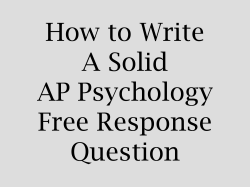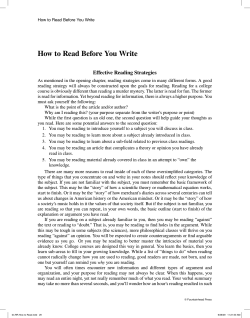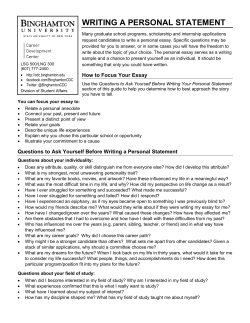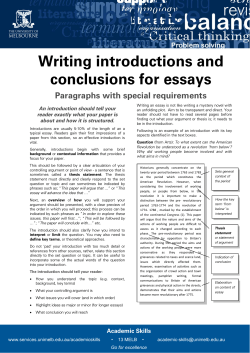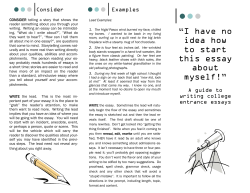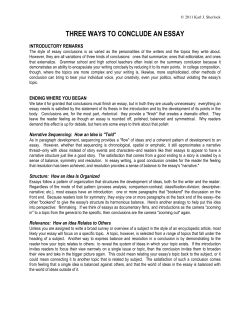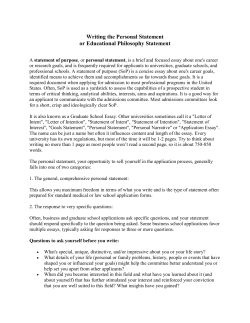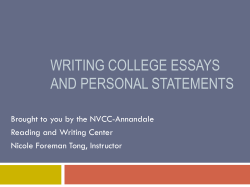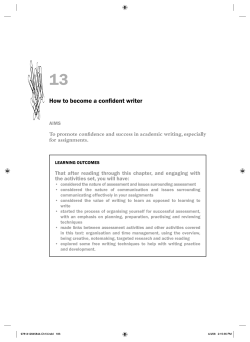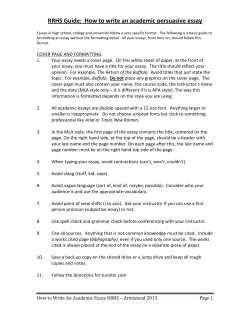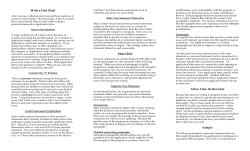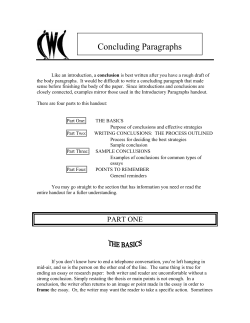
3 Using Appropriate Words in an Academic Essay
3 Using Appropriate Words in an Academic Essay 19 Using Appropriate Words in an Academic Essay As you develop your essay, you need to think carefully about your choice of words. This is very important in academic essays. For example, you would not use contractions (can’t, wouldn’t, isn’t) or shorter forms of words (fridge, auto) because they signal informality and academic writing takes place in what is considered a formal context. In addition, academic essays are expected to be clear and straightforward so you must also make sure that your words are precise and correct and that your writing is concise. This chapter provides suggestions on how to choose appropriate words for your academic essays and gives examples of words that students often use wrongly. There are four main considerations: ● Use formal vocabulary ● Use appropriate transitions ● Avoid redundancy ● Beware of commonly misused words Choosing words that are appropriate in your writing can convince your readers that your work is serious and important. On the other hand, if your words are unclear, ambiguous and/or incorrect, chances are your readers might be confused about the content of your essay or might even think that your work is not worth reading. 3.1 Use Formal Vocabulary Certain words which we frequently encounter in everyday communication may not be suitable for use in academic essays. These include words which are casual (informal) and commonly used only in spoken English. This does not mean that informal language is inferior to formal language. It simply means that there are words which are more appropriate than others for use in each context. 19-26_CUC_SL.indd 19 7/12/09 10:13:48 AM For example, in reporting work done by others in a subject that you are investigating, you would not write: A couple of researchers have found out that... Instead, you are more likely to write: Several researchers have discovered that... Using Appropriate Words in an Academic Essay 20 19-26_CUC_SL.indd 20 To make your essay more formal, make sure that you avoid features of informal language in your writing: Table 1: Examples of formal and informal language Features of informal language Definition Example Appropriate alternative Contractions Shortened words, with missing letters from the original The authors don’t provide evidence for their claim. The authors do not provide evidence for their claim. Slang words Words characteristic of casual conversation among friends or a particular group of people One wonders if cosmetic surgeries really originated from the psychological challenges of busted individuals. One wonders if cosmetic surgeries really originated from the psychological challenges of unattractive individuals. Abbreviations Shortened forms of words and phrases, usually consisting of letters taken from their original forms The survey was conducted ASAP since the respondents needed to leave the country in two weeks’ time. The survey was conducted as soon as possible since the respondents needed to leave the country in two weeks’ time. Clichés Overused expressions or ideas whose original meaning or effect is lost The research of Yuan et al. (2007) on sustainable architecture in Singapore is considered to be the cream of the crop. The research of Yuan et al. (2007) on sustainable architecture in Singapore is considered to be the best. Colloquialisms Words, phrases, or expressions characteristic of ordinary or familiar conversation but, unlike slang, usually not limited to use by only one particular group of people. While current concerns about the loss of jobs in the United States are valid and real, what is more alarming is the growing negative cultural attitude towards India among those who have been Bangalored. While current concerns about the loss of jobs in the United States are valid and real, what is more alarming is the growing negative cultural attitude towards India among those who have lost their jobs because their companies have relocated to India for cheaper labour costs. 7/12/09 10:13:49 AM 3.1.1 Choose strong verbs In general, academic writers prefer strong verbs to phrasal verbs (verb + preposition), which are very common in spoken or more casual uses of English, e.g. establish instead of set up, produce instead of churn out, tolerate instead of put up with and assemble instead of put together. Consider the examples given below: Strong verbs The veteran researcher has churned out many articles in recent years. The veteran researcher has produced many articles in recent years. The team that was hurriedly put together has not been productive because the members do not share common objectives. The team that was hurriedly assembled has not been productive because the members do not share common objectives. In his attempt to establish absolute control, the dictator sought to wipe out all who were opposed to his rule. In his attempt to establish absolute control, the dictator sought to eliminate all who were opposed to his rule. The auditors’ report suggests that the treasurer had tried to cover up the financial irregularities. The auditors’ report suggests that the treasurer had tried to hide the financial irregularities. We must be prepared for discomfort in various sectors if we want to bring about change in the system. We must be prepared for discomfort in various sectors if we want to effect change in the system. 21 Using Appropriate Words in an Academic Essay Phrasal verbs 3.1.2 Choose specific verbs In reporting what you have gathered from reading, you will need to use a variety of verbs that suit your purpose. Rather than using the words say, show or report all the time, you can use more specific verbs in academic reporting as illustrated below: In the article, “Euthanasia”…the author outlines the origins of the practice in the Nazi regime... Many medical studies have demonstrated a clear correlation between smoking and the incidence of lung cancer... The researcher maintains that nanoparticles are likely to remain lodged... The paper concludes that university education must remain accessible to all who qualify and that none should be denied the opportunity... Available literature seems to support the view that one acquires a second language... The report notes that there are inconsistencies in the way the economic data have been presented... Other useful words for reporting what you have gathered in your secondary research are assert, claim, argue, infer, reason, postulate and illustrate. 19-26_CUC_SL.indd 21 7/12/09 10:13:49 AM 3.2 Use Appropriate Transitions Transitions play an important role in the development of an academic essay. They help to create a sense of coherence and provide signposting for the reader to follow the writer’s thread of thought. Choosing the appropriate transition that makes the logical connection will ensure that the reader understands the text in the way the author had intended. Consider the following examples: Using Appropriate Words in an Academic Essay 22 A. The authors have made a strong case for their view and also provided some statistical evidence to support their arguments against euthanasia. On the other hand, they have also appealed to the general moral sense of obligation for doctors to save and heal. B. The authors have made a strong case for their view and also provided some statistical evidence to support their arguments against euthanasia. They have also appealed to the general moral sense of obligation for doctors to save and heal. C. The authors have made a strong case for their view and also provided some statistical evidence to support their arguments against euthanasia. On the other hand, they have failed to consider the further distinction between active euthanasia and passive euthanasia. The use of On the other hand in text A is inappropriate because what follows is not in contrast with the point made in the preceding sentence. The student could have used Moreover or Furthermore since the intention is to add another point in support of the authors’ argument. Alternatively, the text could continue as in B without any transition since the use of also in the sentence adequately links it to the previous one. Text C illustrates the correct use of the transition as it signals a contrast. Here is a text showing another notoriously misused transition: In the last few years, revenue from the export sector has been on the decline. On the contrary, revenue coming from the hospitality industry has seen a healthy growth. In this case, the transition is inappropriate. The student could have used In contrast or On the other hand. On the contrary is used to signal a contrast to an idea expressed just before it or to a claim made or implied, as in the following example: In the last few years, revenue from the export sector has been declining sharply. We might therefore expect to see a reasonable dent in the overall growth of the economy. On the contrary, the economy is still as robust as before. This could be largely due to... 19-26_CUC_SL.indd 22 7/12/09 10:13:49 AM 3.3 Avoid Redundancy Conciseness is also a mark of good academic writing. To write an effective essay, you should learn to write precisely and concisely, using only as many words as are necessary to convey what you want to say. Do not add words just to lengthen your essay or create fancy expressions. It is far more important to get your message across effectively. Redundancy is also commonly seen in the use of more or most as in the following two examples: There is a more preferable method to do this. This is the most unique case we have yet seen. If you prefer something, you like it more than something else; therefore, more is redundant. In the second case, unique means one of its kind, with no equal, so strictly speaking, you cannot have varying degrees of uniqueness. Another area where redundancy occurs is in the use of prepositions. These are often the ones which appear with verbs but are actually not necessary. comprise (of) 23 Using Appropriate Words in an Academic Essay To weed out redundancy, ask yourself whether what you have written is essential to the meaning you intend to communicate. For example, in an essay on euthanasia, a student wrote about deliberate suicide. That raises the question whether suicide is ever not deliberate. Can someone commit accidental suicide? Your answer to the question makes it clear that the word suicide should stand on its own without the qualifier deliberate. emphasise (on) stress (upon) despite (of) discuss (about) request (for) What about the prefix ir~ in the word irregardless? In fact, ir~ has the function of creating the opposite of the adjective as in relevant/irrelevant and reconcilable/irreconcilable. The suffix ~less has a similar function, as in faithful/faithless, careful/careless and painful/painless. Thus, irregardless will have double the effect of the prefix or suffix. Regardless is just fine. 19-26_CUC_SL.indd 23 Do not ad d lengthen words to your essa y or create fancy expre It is far m ssions. or to get you e important rm across e essage ffectively. 7/12/09 10:13:49 AM 3.4 Beware of Commonly Misused Words Some words are commonly misused. For example, the word lesser is often used as a comparative form for less as in: This experiment was completed in lesser time than expected. Using Appropriate Words in an Academic Essay 24 The correct form should be less time since less is a comparative form for little. Lesser is never used as a comparative form of little or less. It is used to refer to something of lower importance, degree or value, as in the common expression the lesser of two evils or lesser mortals. It is also used in some biological names to refer to the smaller cousin of related species of plants or animals, such as the lesser anteater and lesser flamingo. The following examples illustrate the proper use of pairs of words which are commonly confused: I suspect we will not be able to complete this paper in time for publication. I doubt we can complete this paper in time for publication. It has become harder to gain access to the president since the security scare. We need to assess the effectiveness of this new measure that the committee has introduced. The Director’s personal secretary has arranged for a board meeting at short notice. This military exercise involves all personnel who are currently in service. He hung the pictures on the wall in the board room in anticipation of the chairman’s visit. The man convicted of murder was sentenced to be hanged next Friday. ➤ See Chapter 5: Proofreading an essay or report for more advice on locating potential problems in the choice of words in your work. 19-26_CUC_SL.indd 24 7/12/09 10:13:50 AM Conclusion Remember to check that you use formal vocabulary and that you write concisely — without redundancy and precisely — with words that accurately convey your intended meaning. Also, ensure that your transitions make good logical sense and enhance the coherence of the text. Further reading McAnsh, S., & Pennington, K. (2009). Vocabulary choice. Retrieved on 16 June, 2009, from http:// sana.tkk.fi/awe/style/vocabulary/index.html The OWL at Purdue (2009). OWL materials: Using appropriate language. Retrieved on June 14, 2009, from http://owl.english.purdue.edu/owl/resource/608/01/ Study and Learning Centre, RMIT University (2009). Writing in an appropriate style. Retrieved on June 16, 2009, from http://www.dlsweb.rmit.edu.au/lsu/content/4_WritingSkills/writing_pdf/super_ style.pdf 25 Using Appropriate Words in an Academic Essay In addition, you may encounter other situations of uncertainty or confusion. The best guide would be a good dictionary, one that gives you examples of usage. You can also refer to online corpus resources such as the British National Corpus at http://sara. natcorp.ox.ac.uk/lookup.html to check how words are used in published works. If help is not available, it is safer to choose to be simple and clear rather than risk confusing your reader. Chapter contributed by Richard SEOW 19-26_CUC_SL.indd 25 7/12/09 10:13:50 AM Using Appropriate Words in an Academic Essay 26 19-26_CUC_SL.indd 26 7/12/09 10:13:50 AM
© Copyright 2025
